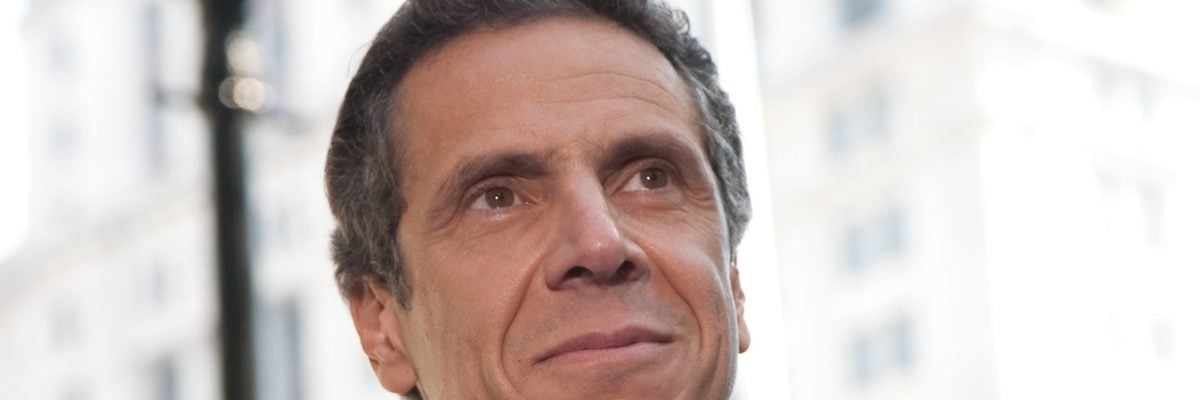
On Tuesday, New York governor Andrew Cuomo signed into law the most radical state abortion law in the country. By explicitly restricting legal personhood to those who are “born,” the new law would seem to preempt any effort to curb abortion access in any circumstance. It also looks like the law will prevent criminal or civil courts from pursuing homicide charges when an unborn baby—even one that is “wanted” by the mother— is killed through malice or negligence.
Cuomo, of course, is the same governor who made headlines a few years ago when during a radio interview he declared that pro-lifers or those who oppose same-sex marriage have “no place” in the Empire State. Those words ring even more ominously today, as a bold new breed of anti-Catholic politician tries to establish that such people—that is, all faithful Catholics—have no place anywhere in American public life.
From one senator snidely informing a Catholic judicial nominee, “The dogma lives loudly within you” to another suggesting that membership in the Knights of Columbus makes you a pariah unfit for public service in a democracy, we are witnessing a growing effort to establish a de facto religious test. If it can be established that pledging allegiance to abortion, contraception, and sexual license in its many forms is non-negotiable, a basic starting point for taking part in the national conversation in the same way that acknowledging racial equality or religious tolerance is (nobody thinks a Klansman or a Nazi should be a federal judge, for instance), Catholics will have to choose between apostasy and isolation. The latter likely will turn quickly into persecution.
It’s sad, but also fitting, that Cuomo should be the son of Mario Cuomo, the Catholic former New York governor and presidential candidate who, in his famous speech at Notre Dame in 1984, blazed a false trail of conscience for Catholics whose policies contradict their Faith. In it, he applied to abortion the principle that JFK had established two decades earlier when he promised that, because of his “absolute” separation of Church and state, his Catholicism would not inform his politics. In this brilliant and elegant piece of rhetoric, Cuomo anticipates, echoes, or outright invents most of the now-familiar tropes of Catholic pro-abortion politics:
- That despite his personal acceptance of Church teaching on abortion and his belief that human life is due “reverence,” he cannot force these “religious values” on a pluralistic society.
- That to be pro-life is every bit as much about opposing nuclear weapons (it was the ’80s), world hunger, and unemployment as it is about stopping abortion.
- That an effective pro-life strategy must focus on diminishing abortion’s root causes, and on improving social welfare, rather than on pro-natal legislation.
- That the historical speculations of Catholic theologians and philosophers about the inception of human life in the womb may provide Catholics mental wiggle room for prudential judgments about abortion policy.
- That the “complexity” of the abortion issue forces us to eschew absolute judgments and solutions. In essence, it’s above all our pay grades.
Cuomo concluded by observing that American Catholics had left the “ghetto” (he doesn’t reference Kennedy, but the connection is clear) and that a challenge now lay before them:
The Catholic Church has come of age in America. . . . This newfound status is both an opportunity and a temptation. If we choose, we can give in to the temptation to become more and more assimilated into a larger, blander culture, abandoning the practice of the specific values that made us different, worshipping whatever gods the marketplace has to sell while we seek to rationalize our own laxity by urging the political system to legislate on others a morality we no longer practice ourselves.
Or we can remember where we come from, the journey of two millennia, clinging to our personal faith, to its insistence on constancy and service and on hope.
Here Cuomo warns, with florid language that masks his illogic, that for Catholics to fail to keep their faith “personal” (by imposing it politically through pro-life laws) would represent a selling-out to the world, substituting a tarnished and legalistic public morality for the pure (and purely internal) observance of God’s laws “in our hearts and minds.” The end result of this failure would be “assimilation” and loss of identity.
That’s right: in this twisted reasoning, not to betray Catholic teaching on the value of unborn life would be to betray Catholicism. To uphold Catholic teaching would somehow lead to assimilation by the culture.
Now flash forward thirty-five years. Mario Cuomo got his wish. Catholics did not “impose” on larger society their personal religious beliefs about abortion. The red herrings he espoused—the seamless garment, the “root cause” argument, the supremacy of personal conscience—have become dicta.
By his prediction, American Catholics should today be a “light to the nation . . . leading people to truth by love.”
Instead, yesterday Andrew Cuomo—Mario’s physical but also spiritual son—ordered the tallest building in the nation to be lighted in a sick celebration of a thing that is the opposite of truth and love. He said he hoped it would be “a bright light forward for the rest of the nation to follow.”
Our Lady of Guadalupe, patroness of the Americas and the unborn, pray for us.
Image: Pat Arnow via Wikimedia Commons.



